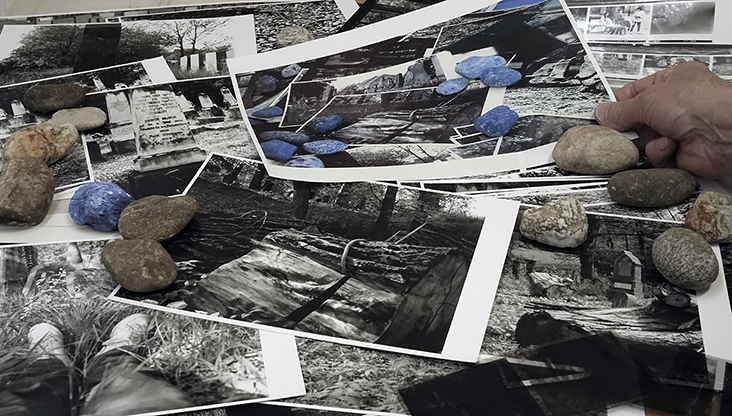Due to the ongoing COVID-19 situation we have decided to postpone our summer school “Materialities & Subjectivities. Accounting for Complicated and Complicating Entanglements in the Humanities” to 2021. We will host our “Materialities & Subjectivities” summer school next year from Monday, September 6 – Friday, September 10, 2021 on the same topic!
Materialities & Subjectivities
Accounting for Complicated and Complicating Entanglements in the Humanities
31 August – 4 September 2020, Hotel Alpha Soleil, Kandersteg, Switzerland
Since the 1990s, the humanities’ interest in material and materiality has been growing steadily. A material turn has been called out in order to coin a programmatic shift away from social constructivism and a text-heavy linguistic turn, which was criticized for maintaining modern and humanist binaries such as matter/subject, or nature/culture.
Feminist new materialists advocated for embracing the vitality of matter as it encompasses humans and non-humans alike (e.g. Donna Haraway, Karen Barad, Jane Bennett). The latter’s rejection of anthropocentrism aligns feminist new materialism both with speculative realism (e.g. Quentin Meillassoux), a branch in philosophy that demanded a recognition of an autonomous reality that is independent of man and their consciousness, and with Actor Network Theory (ANT) (e.g. Bruno Latour), which positions humans as one actor amongst other “actants” who collectively form networks with particular capacities. And in regard to the emergence of New Media, media theorists such as Friedrich Kittler made a case for considering technology as essentially autonomous, leaving the human and written history behind.
While some matter-oriented approaches might have overstated the power of matter and technology by seemingly asserting and sometimes celebrating its primacy and self-sufficient agency (e.g. Kittler’s polemic “driving the human out of the humanities”), for most of them (as well as this summer school), a return to matter does not mean to discount subjective, conceptual/ideal, discursive, or socio-cultural constructions of gender, class or race. The concepts that interest us consider how material objects, bodies, spaces, media stores and tools, technology, conditions are entangled with discourses and subjectivities, and how agency is co-produced—always infected by power modalities.
A mode of thinking through the intersections of (non)human life (bodies, animals, viruses, etc.), inorganic matter (particles, stone, waste, medial tools, technology, infrastructure, etc.), environmental phenomena (climate, streams, pollution, etc.) and socio-cultural or subjective/sensitive constructions puts forward a complicating, connecting, vibrant, processual, transmedial and open way to conceptualize the world, undermining an all too monolithic conception of systems, structures, fields, disciplines, and research objects. It allows us to think from transitions and beyond borders.
The summer school of 2020 analyzes and discusses present and past material and conceptual entanglements both as research topics and as a mode of thinking from (art)historical, literary, sociological, cultural, philosophical, archaeological, intermedial and artistic perspectives. It addresses the following questions a.o.:
- What do we really mean, when working with broad concepts such as “materiality” and “subjectivity”? How might a post-millennial (digital) approach differ from older conceptions?
- Since a shift towards the material might decentralize and destabilize the human subject and turns towards non-human performativity, while being a conceptual device nonetheless, how can we reasonably reconcile the material and conceptual/ideal, body/matter and sign/text, or, if necessary redefine it?
- Since thinking in entanglements is fundamentally about potentially limitless spatio-temporal relationality (“fields of force and flows of material”, as Tim Ingold stated)—how can we still reasonably delimit our research, keep it focused and avoid arbitrariness?
- In what ways might performative, experiential, artistic or sensorial methodologies and methods help us to study entanglements of materialities and subjectivities? How can we, for example, account for sensual, aesthetic and performative aspects of material culture in our own research output—in text, visual, auditive, or intermedial forms?
Keynote Speakers
Prof. Dr. Christian J. Emden (Professor of Politics, Law & Social Thought, Rice University)
Regarding the topic of the Summer School 2020, his areas of expertise include modern intellectual history, history of life sciences, history of scientific materialism and positivism, European philosophy since 1750, new materialism (critical gaze), genealogy of philosophical naturalism and political realism, theories of subjectivity.
Prof. Dr. Caroline van Eck (Professor of Art History, Director of Studies of King’s College, University of Cambridge)
Regarding the topic of the Summer School 2020, her areas of expertise include art and architectural history (mainly 18th and 19th Century), anthropology of art, organicism in artistic theory and practice, agency, excess and material presence of art works, entangled history.
tba
Call for Application
For further information about the summer school and the application procedure (extended application deadline Mai 10, 2020), please have a look at our call.


